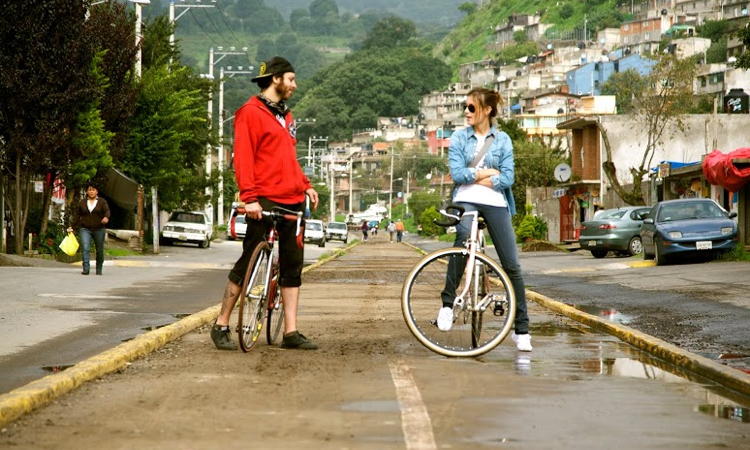By Gary Suderman · January 23, 2014

Rezeta arrives in Mexico City with ambitions to further her career as a model; she hails from Albania (or is that Kosovo?) and has the tattoos to prove it. She is also relentlessly beautiful, which can be a perk or a liability, depending on the men who want to seduce her, and for what purpose. She passes Diego Rivera’s mural portrait, intended as a commentary on social strata, but she may or may not think of the plight of her new fellow countrymen. Sometimes she wears her heart on her sleeve. Sometimes she is impossible to read. She can be loving. She can be reckless. And this film, which bears her name, about her tempestuous time in Mexico’s Federal District, is anything but boring. Rezeta represents the arrival of Fernando Frias, a bold new voice in Mexican cinema, who brings with him a cast and crew that match his energy and thirst for life.
The movie benefits from casting actors similar to the characters they play, so much to the point that the fictional character Rezeta is played by Rezeta Veliu, who shares nearly an identical background, geographically speaking at least. As Alex, Roger Mendoza’s wry outlook and musical prowess make him an ideal counterpoint to the often impulsive and intense Rezeta, whose limited language skills are a frequent running gag. In a series of whirlwind seductions and inconsequential affairs, edited frenetically by Yibran Asuad, we find ourselves alternately in the high-gloss world of fashion shoots and the close quarters of the photographers’ bedrooms. Soon Rezeta’s attention turns to Alex, while the song plays in Spanish, “If we are only friends, why do you kiss me like you do?” A car left idling outside a house prompts her to challenge him to steal it; instead, Alex takes the keys out and throws them. Once they make the move to become lovers, the film shifts into an exploration of the challenges of undertaking a meaningful relationship in an often superficial world.
As a treatise on the dynamics of living in the cultural melting pot of Mexico City, Rezeta underscores the difficulties of love in modern society but allows the audience to reach its own conclusions. With cinematography by Emilio Valdes that matches the breakneck pace of Rezeta’s life, the film achieves an almost contradictory balancing act between our own proximity to the character of Rezeta and the occasional difficulty of knowing her true thoughts and feelings. It is often Alex with whom we relate more. The seeming domesticity of their new apartment together (“Now I know you want babies,” in Alex’s words) is confirmed with her gift of a 9,000 piece puzzle. Later we go to darker places in a scene featuring the slow motion decimation of a living room and then an extended sequence tracking the two characters in a pulse-pounding nightclub. Throughout it all, the film never loses its unique perspective and its lively energy, even as it challenges us to reflect on cultural, language, and gender barriers.
The vision of Rezeta has been deservedly compared to Alfonso Cuaron’s Y Tu Mama Tambien. Both paired a seemingly simple story with deeper underpinnings, yet the crucial difference of Rezeta is that its main protagonist offers a foreign perspective and experiences a different Mexico; nonetheless, the film is profoundly Mexican in the best way possible. Additionally, it represents the true Slamdance ethos, in that limitations of budget have become irrelevant in the face of accomplished directing, acting, and storytelling. Fernando Frias has given his country a film to be proud of; I hope that he and his compatriots continue to push boundaries and boldly define cinema for their generation.